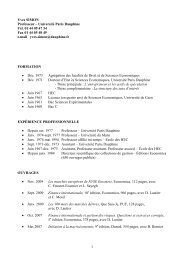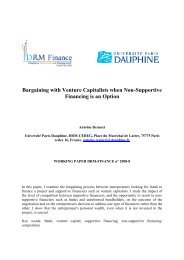Corporate governance and earnings management ... - CEREG
Corporate governance and earnings management ... - CEREG
Corporate governance and earnings management ... - CEREG
Create successful ePaper yourself
Turn your PDF publications into a flip-book with our unique Google optimized e-Paper software.
Introduction<br />
It was several decades ago that accounting ceased to be considered as a pure technique <strong>and</strong><br />
came to be seen as an instrument for social <strong>management</strong> <strong>and</strong> change (Hopwood, 1976;<br />
Burchell et al., 1980; Puxty, Willmott, Cooper & Lowe, 1987), i.e. a “social rather than a<br />
purely technical phenomenon” (Burchell, Clubb & Hopwood, 1985, p. 381). Gilling (1976),<br />
as Burchell, Clubb <strong>and</strong> Hopwood mention (1985, p. 382), not only “notes the fact of <strong>and</strong><br />
argues the necessity for accounting change under the impact of environmental (social <strong>and</strong><br />
technical) change”, but also attempts to provide “some underst<strong>and</strong>ing of the underlying social<br />
<strong>and</strong> institutional forces at work”.<br />
This article sets out to show that if there is one issue that perfectly reflects the “game”<br />
among the social <strong>and</strong> institutional forces, goodwill is the one. Based on a study of four<br />
countries which played a major role at the time of the industrial revolution, Great Britain, the<br />
United States, Germany <strong>and</strong> France, we illustrate the role of four groups of “social forces”<br />
(expression namely used by Burchell, Clubb <strong>and</strong> Hopwood (1985, p. 382)): lawyers, bankers,<br />
tax administrations <strong>and</strong> capital markets. We demonstrate that the four countries studied have a<br />
common starting point, a time when the lawyers were dominant, <strong>and</strong> have made their way to a<br />
common destination, due to the current importance of capital markets. But the routes they<br />
took were different, precisely because the social forces’ roles were distributed differently in<br />
each country.<br />
As Leake (1914, p. 81) pointed out, the “word ‘Goodwill’ has been in commercial use for<br />
centuries, as is shown by the following references to old writers: 1571 Will & Inv. …, I gyve<br />
to John Stephen … my whole interest <strong>and</strong> good will of my Quarrell (i.e. quarry). … having<br />
given a hundred pounds for my predecessor’s goodwill”.<br />
Our study does not reach so far back in time, but still covers a period of more than a<br />
century, starting from 1880. This can be considered a key date in Germany, the country with<br />
the longest history of goodwill, but also in Great Britain (Bryer, 1995, p. 291). Hughes (1982,<br />
3



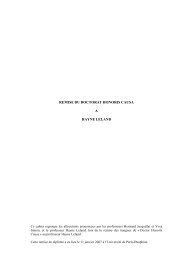
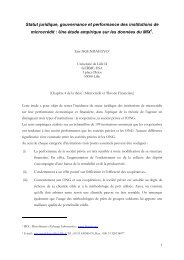
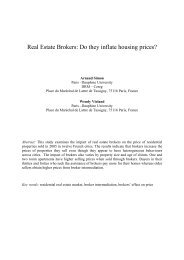
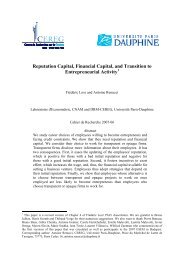
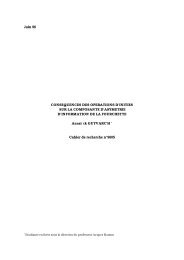
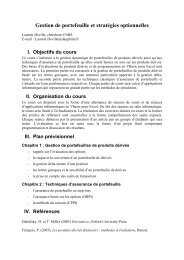
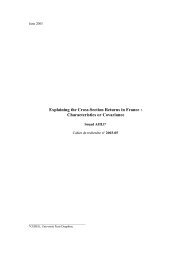
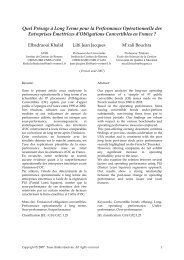

![& 6 ] ^ F ]^ - CEREG - Université Paris-Dauphine](https://img.yumpu.com/33326502/1/184x260/-6-f-cereg-universitac-paris-dauphine.jpg?quality=85)

